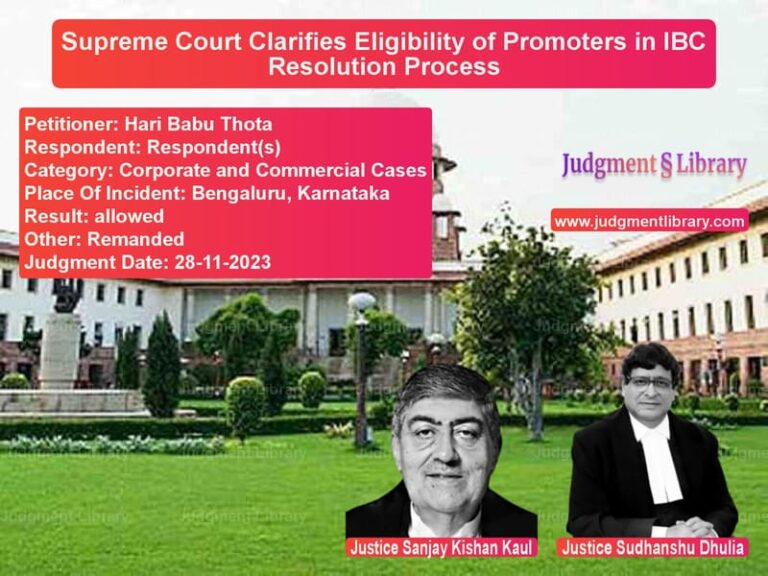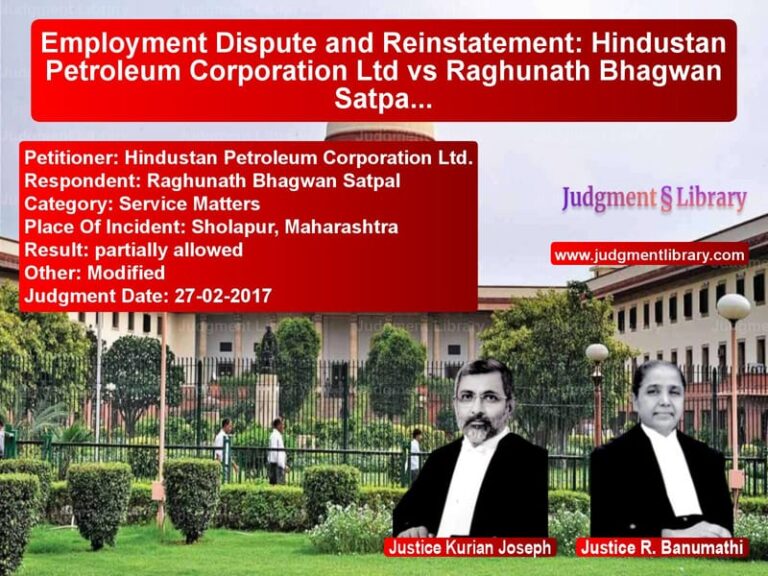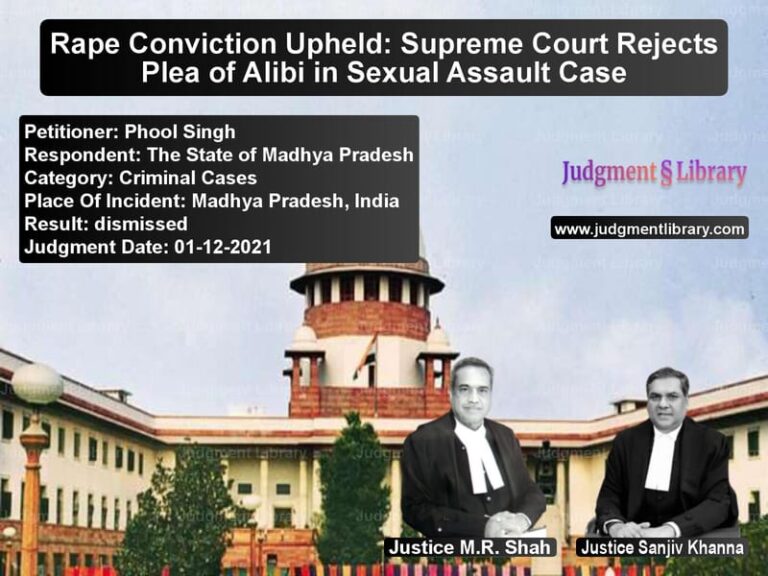Supreme Court Recognizes Employer Liability in Work-Related Road Accident Case
The case of Daya Kishan Joshi & Anr. vs. Dynemech Systems Pvt. Ltd. revolved around the liability of an employer under the Employees’ Compensation Act, 1923. The Supreme Court was called upon to decide whether an employee’s death in a road accident while returning from a work-related assignment was covered under ‘accident arising out of and in the course of employment’ under Section 3(1) of the Act.
Background of the Case
The deceased, Ravi Shekhar Joshi, was employed as an engineer with Dynemech Systems Pvt. Ltd. His responsibilities included promoting sales and overseeing the installation of the company’s products. On September 8, 2007, Joshi and his co-worker, Vikas, were assigned to test a filter installed at the Hero Honda Factory in Dharu Heda, Haryana. After completing their work, they began their return journey to Delhi. Unfortunately, they met with a road accident near the factory, resulting in Joshi’s death while his co-worker sustained minor injuries.
Joshi’s parents, the appellants, filed a claim for compensation under the Employees’ Compensation Act, 1923. The Commissioner for Employees’ Compensation dismissed the claim, ruling that the accident did not arise out of and in the course of employment. The Delhi High Court upheld this decision. The appellants then approached the Supreme Court.
Arguments Presented
Appellants’ Arguments (Daya Kishan Joshi & Anr.)
The appellants contended that:
- The deceased was traveling for an official assignment and had not completed his work until he safely returned to his headquarters.
- The nature of his employment required him to be on the road, making the accident incidental to his work.
- Indian courts have long recognized the doctrine of notional extension, which holds that an employee remains in the course of employment even during travel if required by the job.
- The High Court erred in applying an outdated precedent and failed to consider modern employment conditions.
Respondent’s Arguments (Dynemech Systems Pvt. Ltd.)
The respondent countered that:
- The accident did not occur at the workplace but on a public road, making it unrelated to employment.
- The deceased had finished his work and was returning home, meaning he was no longer engaged in employment duties.
- The claim should be rejected since commuting to and from work is not covered under ‘accident arising out of and in the course of employment.’
Supreme Court’s Observations
The Supreme Court analyzed whether the deceased’s travel was incidental to his employment and whether the accident had a causal relationship with his work. The Court held:
“When an employee is required to travel as part of his official duties, the employment extends beyond the employer’s premises and includes travel time until the employee safely returns.”
The Court further clarified that the phrases ‘arising out of employment’ and ‘in the course of employment’ must be interpreted in the context of modern working conditions:
“There must be a causal connection between the accident and the employment. The accident should result from a risk incidental to the employment, not a risk common to the public.”
Referencing precedents such as B.E.S.T. Undertaking vs. Agnes and Mackinnon Machenzie & Co. (P) Ltd. vs. Ibrahim Mahmmed Issak, the Court emphasized:
“An employee does not cease to be in the course of employment merely because he leaves the workplace. The employment extends to areas necessary for the performance of duties.”
Final Judgment
The Supreme Court ruled in favor of the appellants, setting aside the High Court’s decision and remanding the matter back to the Commissioner for a reassessment of the compensation claim. The Court held that:
- The accident occurred in the course of employment as the deceased was on an official assignment.
- Employers must recognize travel risks as part of work obligations when employees are assigned duties requiring travel.
- The High Court failed to consider the principles of notional extension in employment law.
- The Commissioner must now decide the quantum of compensation to be awarded to the appellants.
The Supreme Court concluded:
“The appeal is allowed, and the case is remanded to the Commissioner under the Employees’ Compensation Act for a fresh decision on compensation.”
Implications of the Judgment
This ruling has significant implications for employee rights and employer liability:
- It establishes that employees required to travel for work remain in the course of employment until they return safely.
- The judgment expands the scope of employer liability under the Employees’ Compensation Act.
- It ensures that employees who suffer work-related travel accidents receive just compensation.
- The decision discourages employers from denying liability in travel-related work injuries.
Conclusion
The Supreme Court’s ruling in this case strengthens the principle that employment extends beyond office premises, especially for employees required to travel. By recognizing that the accident occurred in the course of employment, the Court has set a precedent ensuring that employers remain accountable for work-related travel risks.
Don’t miss out on the full details! Download the complete judgment in PDF format below and gain valuable insights instantly!
Download Judgment: Daya Kishan Joshi & vs Dynemech Systems Pvt Supreme Court of India Judgment Dated 09-08-2017.pdf
Direct Downlaod Judgment: Direct downlaod this Judgment
See all petitions in Employment Disputes
See all petitions in Public Sector Employees
See all petitions in Workplace Harassment
See all petitions in Judgment by R K Agrawal
See all petitions in Judgment by Mohan M. Shantanagoudar
See all petitions in allowed
See all petitions in Remanded
See all petitions in supreme court of India judgments August 2017
See all petitions in 2017 judgments
See all posts in Service Matters Category
See all allowed petitions in Service Matters Category
See all Dismissed petitions in Service Matters Category
See all partially allowed petitions in Service Matters Category







